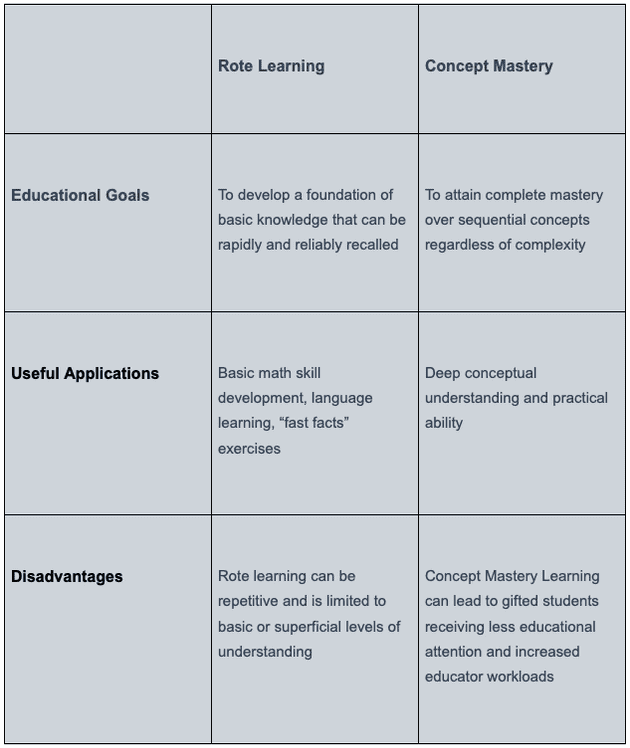Concept mastery learning is an increasingly popular educational strategy that has been linked to exceptional learning outcomes compared to traditional strategies.
Learning mastery was introduced as a teaching model in the 1960s by Benjamin Bloom, a highly influential and celebrated educational psychologist who famously stated that students can master any task given the right conditions.
Interestingly enough, many of the conditions championed by Bloom have seen a resurgence in study and application in recent years, including personalized learning, alternative learning opportunities for struggling students, and de-emphasizing the amount of time it takes for a student to attain mastery over a concept.
In this article, we’ll take a deep dive into concept mastery and how it helps students reliably attain exceptional learning outcomes.
What Is Concept Mastery?
Benjamin Bloom introduced the revolutionary instructional strategy and educational philosophy of mastery learning in 1968.
Mastery learning strategies represented a significant deviation from traditional teaching philosophies because it maintained that students must first obtain a significant level of mastery over prerequisite topics before being able to advance to more challenging information.
Another unique aspect of mastery learning was Bloom’s assertion that every student could attain mastery over any concept or skill given the time, feedback, and support needed during the learning process was provided by their instructor.
This shift in educational philosophy represented the introduction of a new perspective on the relationship between learning models and levels of mastery that placed the responsibility of student failures at the feet of instructional and curriculum shortcomings and quality of instruction, rather than student effort or intelligence.
Unlike traditional test-based learning strategies, mastery learning strategies focus on providing students with personalized instructional strategies and as much time as is needed to cultivate concept mastery.
Rote Learning vs Concept Mastery
Rote learning is characterized by repetition-based memorization. Concepts commonly learned through rote memorization include:
- The alphabet
- Numbers and counting
- Multiplication and division tables
- Language learning
Rote learning can be useful for building basic, foundational knowledge but falls short when it comes to developing a deeper understanding of concepts and skills. Rote learning also fails to build upon students’ prior knowledge, limiting the odds of attaining mastery over a given subject.
Rote Learning vs. Concept Mastery
Before we dive in further, let's quickly review rote learning versus concept mastery with Professor Judah Schwartz and Kreg Moccia.
"The purpose of rote learning in any subject is to help people develop fluency," says Dr. Schwartz, Professor of Education Emeritus at Harvard & MIT. What does rote learning look like in math? Professor Schwartz cites the multiplication tables that we learn in elementary school. There is value in memorizing them, such as easier recall and not having to rely on a calculator for smaller calculations.
However, it is also vital to understand deeper, underlying math concepts so that learnings can be applied more broadly. "Given that fluency is important, so is conceptual understanding," says Dr. Schwartz. Yup's Director of Academics Kreg Moccia agrees and points out the difference between knowing "a process for solving this problem" versus knowing "a process for solving any problem."
"The latter is a transferable way of thinking about math problems," says Kreg. This transferable knowledge is applicable to situations far beyond a given problem set, lesson, or grade level.
Research by thought leaders like Carol Dweck shows us that everyone is capable of mastering a concept when provided personalized learning strategies and a Growth Mindset environment.
Three Ways Math Concept Mastery Contributes to Academic Success
Math concept mastery contributes to ongoing academic success in ways that might surprise you.
Here are three reasons concept mastery helps students achieve long-term academic success.
1. It Builds a Strong Foundation
Think of learning like building a house. You can't feasibly build a structure that will stand the tests of time without first setting a sturdy foundation. Conceptual understanding is that anchor!
Understanding concepts is key to learning, and mastery learning is a process that is different for everyone. Students will make mistakes and learn what works for them in their own time.
This strategy builds a strong foundation by identifying and filling knowledge gaps. This gives them the prerequisite skills they need to tackle more complicated problems down the road.
2. It Builds Confidence
If you began building a house without a strong foundation, would you feel very confident in its ability to hold up? When a student knows they have a strong foundation in math, they feel more confident in their abilities. When students feel more confident in their concept mastery, it lends to a more positive relationship with math and learning.
A positive relationship helps motivate students to more actively participate in their own learning by asking questions, collaborating with teachers, and applying feedback. When students are in control of their learning, they’re better equipped to self-evaluate their own progress.
3. It Prepares Students for the Future
Without a strong foundation, students may find themselves ill-equipped for future problems, classes, and even careers. In the end, the goal of concept mastery is to cultivate self-motivated, independent, and enthusiastic learners who aren't afraid to take on new challenges and work with others to solve more complex problems. Internalizing learned concepts promotes long-term student success.
For more reasons why it's important to learn math, you can download our free whitepaper from this blog post: 3 Ways to Explain the Importance of Math to Your Children.
How Does Yup Ensure Concept Mastery?
Yup's pedagogy is designed to drive concept mastery. To accomplish this, Yup tutors follow a set of core principles when working with students
Growth Mindset
The first principle is based on Carol Dweck's Growth Mindset model, in which instructors encourage students to believe in themselves and see mistakes as opportunities for growth.
Many students operate under a “fixed mindset” when it comes to mathematical ability and mastery potential. This means that students that struggle with math are more likely to say they’re “not a math person” rather than continue to attempt to attain conceptual mastery.
Students that utilize a Growth Mindset recognize that intelligence and academic ability can be developed through a commitment to growth and improvement during their educational journey.
Socratic Method
The second principle is based on the Socratic Method, a learning model in which tutors ask guiding questions to help students find the root of the problem. These two methods help students become independent, critical thinkers who are driven to achieve long-term academic success.
Cristina B., parent of Yup student Ella, recently commented on the positive impact Yup tutors have had on her daughter's grasp of concepts and overall confidence in math:
"The tutors take time to make sure she understands the concepts behind the problems in a way that is very supportive and encouraging. She feels proud of what she does know instead of embarrassed by what she doesn't!"
Read more notes from parents right here! To learn more about how Yup tutors teach for the long term, watch this video about our teaching methods.
FAQs About Concept Mastery in Math
What does mastery mean in education?
Mastery in education can be defined as a standard of achievement that correlates with an identified level of knowledge that can be practically and successfully applied to skills or challenges.
Students who have attained a high level of mastery can be expected to display a strong command over the conceptual and practical aspects of a given educational topic or skill.
What are the strategies for concept learning?
Concept learning relies on strategies like prior knowledge activation, question-based approaches, formal pretests, integrated prerequisite concept reviews, comparing examples and non-examples, and teaching tools like concept trees, visual cues, analogies, and imagery.
What are the main principles of mastery learning?
The main principles of mastery learning state that all students can master skills and concepts when their curriculum builds sequentially upon prior mastery, provides supplementary educational support when necessary, and involves high quality of instruction, frequent feedback, and review opportunities.
Boost Concept Mastery with Personalized Tutoring
Our personalized, one-on-one and small group high-dosage tutoring platform is perfect for accelerating concept mastery and supporting long term academic achievement.
Our highly skilled tutors are accelerated learning experts that understand how to connect with struggling students and stimulate academic progress and growth.
Our unique Teaching Framework encompasses all of the best modern teaching practices recommended by the National Council of Teachers of Mathematics’ (NCTM).
If you’re interested in exploring Yup’s intuitive dashboard and exciting educational features, book a demo today!





